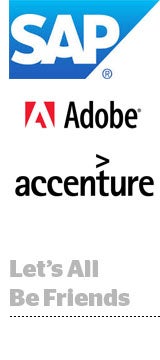 When SAP and Adobe linked arms during last month’s Adobe Summit in Salt Lake City, it was unclear whether the reseller program was more about shared customers or code. But insiders note a third player indirectly involved in what seemed like a two-company partnership: management consulting giant Accenture.
When SAP and Adobe linked arms during last month’s Adobe Summit in Salt Lake City, it was unclear whether the reseller program was more about shared customers or code. But insiders note a third player indirectly involved in what seemed like a two-company partnership: management consulting giant Accenture.
Like SAP, Accenture has been making a push for digital marketing budgets with its acquisition of Acquity Group and earlier grab at design firm Fjord. The consulting firm also has close ties to SAP-run commerce company hybris for digital and ecommerce deployments.
“I think the Adobe-SAP alliance needs to be seen in the context of the broader SAP-Accenture Marketing Performance Solution,” said Martin Kihn, research director for Gartner. “The vision is for SAP HANA to power an Accenture media mix and analytics platform for marketers, who could use Adobe for the upstream stuff SAP and Accenture don’t do, like site analytics and content management.”
Adobe gains a couple of core competencies as a result of an “iron triangle” with SAP and Accenture such as professional services, custom solutions and implementation strength. “[These capabilities] lend Adobe some heft with the hardcore enterprise quants and CFO skeptics who don’t live in the marketing-driven cultures where Adobe traditionally shines,” Kihn noted.
SAP is already pushing itself into new disciplines. Consider the co-branded offering Adobe Analytics from SAP, released shortly after the Summit. Among the features of the co-branded tool is the ability to optimize ad spend and track online and offline marketing campaigns. These are not areas where the supply chain-intensive SAP has traditionally played.
“Digital marketing has become the ‘it girl,’” as Kihn describes it. Agencies and systems integrators like Accenture, IBM and Deloitte are transforming into digital shops while the advanced analytics players like SAP and FICO are essentially rebranding themselves as “marketing analytics” platforms, he said.
This all looks great on paper, but SAP still faces a perception problem in digital circles. Several insiders say SAP reselling Adobe Marketing Cloud alone is not a formidable go-to-market strategy to win over the digital marketing set.
“SAP is trying to rapidly figure out how to catch up here where they’re being absolutely destroyed by moves Oracle and IBM have made,” said Russ Glass, co-founder and CEO of marketing and ad technology company Bizo. “If they’re not willing to make a real aggressive set of moves like acquire a Marketo or Merkle, somebody who can be a foundational layer for them, it won’t work.”
Moreover, the SAP-Accenture go-to-market venture might provide some additional consulting opportunities, but Accenture’s offerings are not exclusive to SAP. In the end it only “makes sense for players like Accenture to remain as neutral and open as possible,” said Peter Kim, chief strategy officer and principal analyst at Constellation Research. “As a services provider, you never want to alienate any tech provider.”
Management consultancies by their very model benefit from maintaining an air of neutrality in selecting technologies for client deployments.
Accenture is aware of this. In an interview following SAP’s acquisition of hybris, Eric Larson, managing director at Accenture, told AdExchanger “we’ve been a significant hybris partner for years. … We, typically, in any of our technology alliances work with the top people in a sector, so we do work with others besides hybris and SAP.”
Kim added: “If you think about the systems integrators, there’s a lot of revenue coming in from SAP implementations, so it’s only in their favor to have a close relationship with SAP. They’re usually working on mission-critical upgrades to client organizations and taking one step over to the marketing world isn’t too far-fetched.”
Another potential side effect is the SAP-Accenture partnership further expands the competitive landscape. This is where “Accenture starts to butt heads with the BBDO’s and Wunderman’s – all of those agencies who are the CMO’s advisors,” Kim said.
The dividing lines between technology and systems integrator (or agency, to that effect) will ultimately be about budget, organizational decisions and good, old-fashioned politics. “It remains to be seen which partners in both service and technology will be standing at the end,” Kim said.














